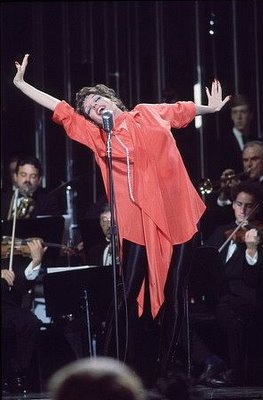David Denby
“.... New York, New York begins like a big-scale '40s-musical: it's V-J Day and crowds are surging through Times Square.... When we first see De Niro's Jimmy Doyle, he's just another ex-GI hunting for a girl… [H]e pursues Liza Minnelli's Francine Evans in the boyishly eager, won't-take-no-for-an-answer style of the young Gene Kelly. A USO singer in uniform with broad shoulders and ruby lips, Minnelli has been made up to look like Betty Hutton or Lucille Ball in her MGM, jolly-good-Joe period….
“.... When we take a second look at De Niro we see he's edgy and reckless, and not in the lovable scoundrel style of Kelly or Dan Daily.... [A]t this point (and many others) we can't tell if he's meant to be an appealing jerk or a semi-psychotic egotist. And Minnelli, poor Minnelli! I don't know what Scorsese wanted from her, but she looks terribly confused, out of it. Staring at De Niro's frantic convolutions, she can barely conceal her dismay, and her mouth falls open in that unfortunate, hurt-animal expression of dumb bewilderment we all know only too well.
“.... In order to understand this romance, we need to see what the lovers had going for them when they were together so we can appreciate what's lost when they fall apart, yet aside from the musical interludes that's simply not on the screen. Minnelli never catches up to De Niro; throughout the movie he's speeding ahead of her, two or three turns around the corner while she's still puzzling over the first thing he's said. There's an element of unconscious cruelty in his work with her: he's so much more flexible and decisive than she, and he almost seems to be using his actor's speed as a form of taunting (listen, you singing lady, don’t' try to act with me). It's a cold, clever repellent performance that is likely to kill (for the moment) De Niro's chances of becoming a box-office hero; the audience simply doesn't warm up to him.
“The forces that drive the couple apart--his lack of success, her sudden pregnancy while on the road--might seem less banal if we sympathized with the characters, but Scorsese's peculiarly manic style of direction further alienates our affections....
“…. [T]he protest against male chauvinism--banal and conveniently modish in itself--doesn't carry much conviction in a film whose female lead is little more than a punching bag who sings....
 “It remains to be said that Liza Minnelli finally claims her revenge. Early in the film she sings some big-band standards in a surprisingly cool, pure and low-keyed style. But that's not really what the audience wants from her; they want her to belt it out in her own style. Thus at the end, when she turns into a big recording and Hollywood-musical star and begins singing songs written for her by John Kander and Fred Ebb (responsible for Cabaret and most of her new material of the last five years), the audience sighs happily (even though the transformation makes no sense), because at last Liza gets a chance to do her thing. In a number called "But the World Turns Round" that is almost identical to the show-stopping "Maybe This Time" from Cabaret, Minnelli, finally free of De Niro, comes completely alive. Starting softly, she works herself up to a delirious frenzy, her voice soaring and soaring, almost out of control. Normally I resist her high-powered, Judy-at-the-Palace hysterics, but coming as it does after two hours of repression, the number is overpowering. Such knock-'em-dead emotionalism may have little to do with art or good singing, but it's the soul of show business and it saves the movie. Scorsese tries to stage a "touching" semi-reunion between the two principals, but you're long past caring--you only want to listen to Minnelli sing still another big number (the title song), and it's almost as spectacular as the first one. Formally and dramatically, New York, New York is a catastrophe, but it's juicy enough to keep moviegoers arguing excitedly throughout the summer.”
“It remains to be said that Liza Minnelli finally claims her revenge. Early in the film she sings some big-band standards in a surprisingly cool, pure and low-keyed style. But that's not really what the audience wants from her; they want her to belt it out in her own style. Thus at the end, when she turns into a big recording and Hollywood-musical star and begins singing songs written for her by John Kander and Fred Ebb (responsible for Cabaret and most of her new material of the last five years), the audience sighs happily (even though the transformation makes no sense), because at last Liza gets a chance to do her thing. In a number called "But the World Turns Round" that is almost identical to the show-stopping "Maybe This Time" from Cabaret, Minnelli, finally free of De Niro, comes completely alive. Starting softly, she works herself up to a delirious frenzy, her voice soaring and soaring, almost out of control. Normally I resist her high-powered, Judy-at-the-Palace hysterics, but coming as it does after two hours of repression, the number is overpowering. Such knock-'em-dead emotionalism may have little to do with art or good singing, but it's the soul of show business and it saves the movie. Scorsese tries to stage a "touching" semi-reunion between the two principals, but you're long past caring--you only want to listen to Minnelli sing still another big number (the title song), and it's almost as spectacular as the first one. Formally and dramatically, New York, New York is a catastrophe, but it's juicy enough to keep moviegoers arguing excitedly throughout the summer.”David Denby
Boston Phoenix, date ?


0 Comments:
Post a Comment
<< Home